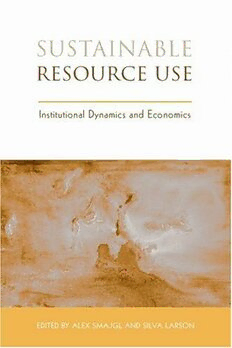
Sustainable Resource Use: Institutional Dynamics and Economics (Earthscan Research Editions) PDF
289 Pages·2007·2.949 MB·English
Most books are stored in the elastic cloud where traffic is expensive. For this reason, we have a limit on daily download.
Preview Sustainable Resource Use: Institutional Dynamics and Economics (Earthscan Research Editions)
Description:
The way that humans organize both resource access and resource use is vital to the management of natural resources. Within different contexts the rules of the institutional arrangements, such as the rules of common and private property rights, become levers by which human behaviors can be modified and steered towards the goals of sustainable natural resource management. Featuring contributions from leading thinkers in the field, this groundbreaking volume examines institutional dynamics from the perspective of natural resource management. The first part discusses institutional diversity and contextual change. The second part analyzes institutional misfit with a strong focus on the long-term impacts of colonial structures in the Asian-Pacific region. Part Three looks at experiences with institutional dynamics in order to ease the tension of such misfits and the fourth part looks at future research needs in the field.Ultimately, through careful argument and by deploying original research, the authors make the case that institutional arrangements cannot be perceived as a set of parameters that can be optimized and locked in for the most efficient functioning of a system. Nor can institutions be evaluated outside the context in which they were developed. Contributing authors: Elinor Ostrom, Katrina Brown, Alex Amankwah, Michael Jeffery, Spike Boydell, Tyron Venn, Donna Craig, Rolfs Gerritsen, Anna Straton, David Brunckhorst, Graham Marshall, Ken Lyons, Kevin Davies, Ed Cottrell, Alexander Smajgl, Melissa Nursey-Bray, Karen Vela, Alexander Herr, John Rolfe, Garrick Small and Silva Larson.Published with CSIRO
See more
The list of books you might like
Most books are stored in the elastic cloud where traffic is expensive. For this reason, we have a limit on daily download.
